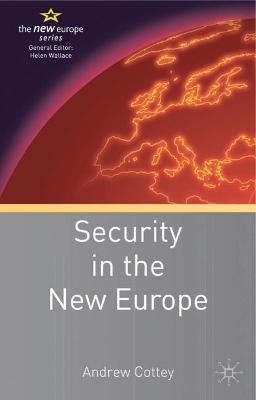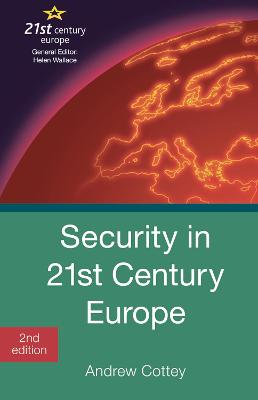21st Century Europe
2 total works
The end of the cold war and the 9/11 terrorist attacks marked the emergence of a new era in European and global security. Europe's traditional security problem of war between European states is being displaced by a new set of challenges with which peoples, governments and organizations like the EU and NATO are only beginning to come to terms. This broad-ranging new text develops a comprehensive framework for understanding the key security issues and dilemmas confronting the new Europe of the Twenty-first century.
Fully revised and updated, the second edition of this leading textbook provides a systematic assessment of security in contemporary Europe. The book examines the changing character of security and assesses the extent of the threats posed by different challenges, as well as the policy dilemmas involved in responding to these concerns.
The nature of security in Europe has been transformed in recent years. Andrew Cottey argues that this is a result of two key developments: the emergence of a security community - a zone of peace where war is inconceivable across much of Europe - and the presence of new security threats such as terrorism and energy dependence. Set in the context of the rising power of non-Western states and the continuing fall-out from the global economic crisis, this text provides a comprehensive analysis of Europe's new security challenges.
Europe's traditional problem of war between states is being displaced by a new and equally daunting set of security challenges. While major war within Europe remains unlikely, the 2008 Georgia war and the 2011 Libya war were reminders that violent conflicts are still prevalent on Europe's periphery and can pose major challenges for European governments, NATO and the EU. At the same time, terrorism, nuclear proliferation as well as non-military problems like mass migration and climate change threaten Europe's security.
This text is the perfect companion for advanced undergraduate and Master’s level courses on European security, whether within courses in Security studies, European studies or International Relations.
New to this Edition:
- New framework for analysing European security
- Highly topical issues covered, including Arab Spring, rise of BRIC countries, terrorism and European energy dependence
The nature of security in Europe has been transformed in recent years. Andrew Cottey argues that this is a result of two key developments: the emergence of a security community - a zone of peace where war is inconceivable across much of Europe - and the presence of new security threats such as terrorism and energy dependence. Set in the context of the rising power of non-Western states and the continuing fall-out from the global economic crisis, this text provides a comprehensive analysis of Europe's new security challenges.
Europe's traditional problem of war between states is being displaced by a new and equally daunting set of security challenges. While major war within Europe remains unlikely, the 2008 Georgia war and the 2011 Libya war were reminders that violent conflicts are still prevalent on Europe's periphery and can pose major challenges for European governments, NATO and the EU. At the same time, terrorism, nuclear proliferation as well as non-military problems like mass migration and climate change threaten Europe's security.
This text is the perfect companion for advanced undergraduate and Master’s level courses on European security, whether within courses in Security studies, European studies or International Relations.
New to this Edition:
- New framework for analysing European security
- Highly topical issues covered, including Arab Spring, rise of BRIC countries, terrorism and European energy dependence

